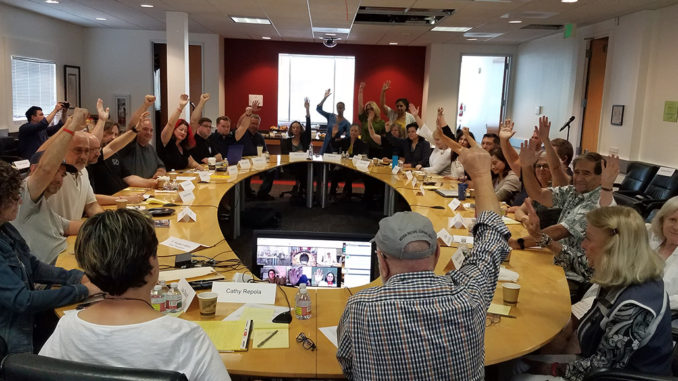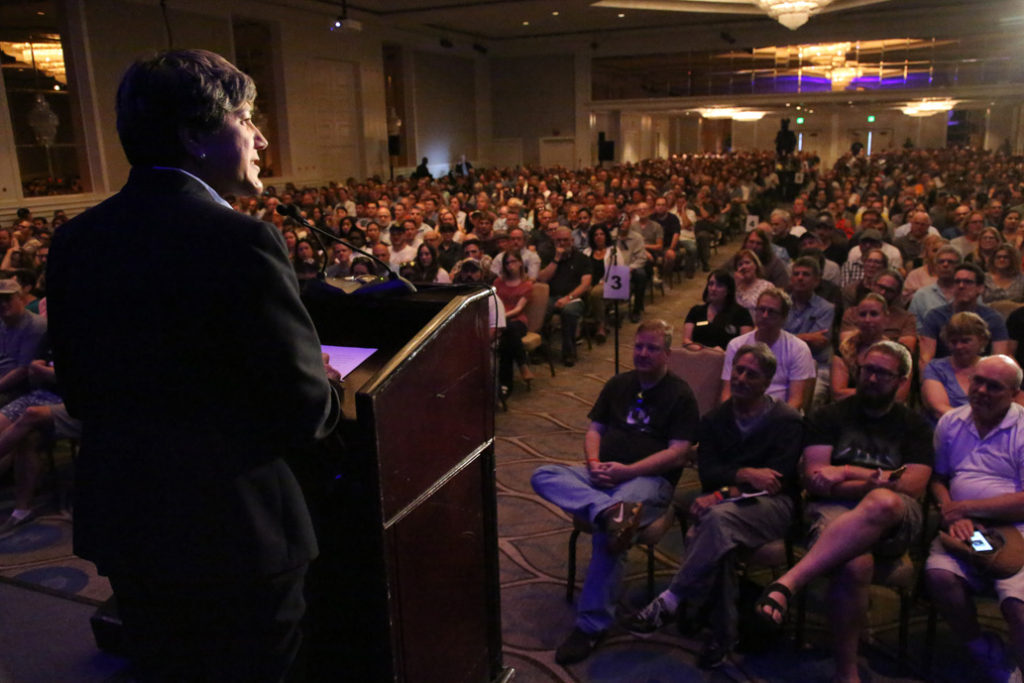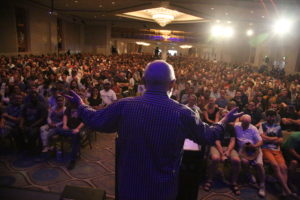
by A.J. Catoline
Since a tentative deal was announced last week between the Alliance of Motion Picture and Television Producers (AMPTP) and the International Alliance of Theatrical Stage Employees (IATSE) there has been a groundswell on social media of rank-and-file members speaking out against the terms of the three-year contract, which will be subject to a ratification vote in the coming weeks.
There is a vast gulf between the position of the Editors Guild Board of Directors — which voted unanimously on July 28 to recommend members “Vote No” — and the IATSE International President Matt Loeb, who has hailed the deal as a “huge victory.”
Local 700 members are rallying around their leadership in condemning the deal online, a tentative agreement that National Executive Director Cathy Repola deemed “totally unacceptable.”
Local 700 members are coalescing online in criticizing the deal for being “inadequate” in addressing health, pension and safe hours. The Editors Guild has compiled a website where these points are explained in detail at www.editorsguild.com/2018ContractTalk.
In the coming weeks, each of the 13 locals will send ballots out to their respective members. A majority vote against ratification would not only be a rejection of the contract, but could also lead to a strike.
On Facebook, the 2018 IATSE Contract Forum swelled to 13,300 members as of August 1. If these are active members, they represent nearly one-third of the 43,000 film and television craft workers under the IATSE Basic Agreement.

A Deal That Is Not Enough
Members feel that this is not a typical negotiation year, especially when the union walked out of the first two meetings with the producers in May and June. Also, there was increased engagement as the Editors Guild held its largest special member meetings in its 81-year history during the week of July 16.
In online comments, members criticized that negotiators may have “left the table too soon” and questioned why Loeb did not push harder in the final round.
“Three percent is not a significant wage gain when it’s the same one we’ve gotten for years and it barely keeps up with inflation nationally, and is actually below inflation in the states where most members live,” wrote assistant editor Jason Brotman in the contract forum. “If this is the best IATSE can do, they’re doing a truly horrendous job of it.”
Inadequate Funding for the Health and Pension Plans

The most contentious issue of the negotiation has been securing funding for the pension plan from new media residuals. Funding from existing secondary markets has dried up in favor of new streaming.
The IA sought a residual for high-budget streaming video on-demand (SVOD) in foreign markets that was pattered after the DGA and WGA deal. They did not achieve it.
Instead negotiators got a residual for streaming live-action features with budgets of $30 million or more, and animated features with budgets of $45 million or more, with both genres requiring a theatrical and streaming release, and only for films longer than 96 minutes.
Members criticized that the tentative deal is too narrow a window, and too large a loophole. “We’re going to start seeing a lot of features no longer than a 95-minute runtime,” a member posted. “And the studios will look to editors to make that happen, so it’s self-defeating,” said another.
The tentative agreement increases health contributions with funding from the traditional studios paying a lesser rate, and another for independent companies and upstart competitors.
While power-house streaming companies like Netflix and Amazon would be part of the latter group paying more, so are many small businesses that are union signatories, such as independently owned and operated post-production facilities and sound houses. Often these small businesses are direct competitors to studio-run facilities.
Repola criticized this funding structure, saying, “This allows the studios to put a burden on smaller companies while avoiding any substantial contributions to the plans themselves.”
It is estimated some of these smaller companies, such as union sound houses and post-production facilities, would see a significant increase in employee health contributions over the three-year contract term, placing them at a disadvantage to their studio competitors. This could have a negative impact organizing new union shops.
“It’s patently unfair, and overall it’s bad for workers and for the entire industry. It will drive the little guys out of business,” said sound editor Jeremy Olsen, MPSE.
Across thousands of postings on Facebook, Instagram and Twitter, members are not expressing confidence that the tentative deal would provide needed funding to the pension plan.
“Your pension will come into play at some point in your life,” posted Scott Smith, a retired picture editor and lifetime member of the union. “Now is the time to remain UNION STRONG. It’s time to go back to the bargaining table and turn up the heat.”
Threatening the Solidarity of the 13 Locals in the Bargaining Unit

Another sticking point is the goal for safe working hours. Days in film and TV production can typically extend to 16-hours. The tentative deal does increase rest breaks between shifts, known as turnaround time, to 10 hours, but with numerous exceptions and carve-outs. The deal excludes pilots and first-season television, where excessive overtime is a huge problem. Also Local 700 was carved out to only receive nine hours of turnaround.
This has outraged many members. Picture editor Amy Duddleston said, “It divides our different locals into the haves and have-nots. That isn’t solidarity.”
Repola addressed the perceived anger in a post on the I am the Union Facebook page. “Some people are saying Local 700 is mad because we got one hour less turnaround than everyone else,” Repola posted. “The truth is, we are not mad. We think it was wrong. But that speaks to the commitment we all made, the IA and the locals, to not let any one local get singled out.”
A deal that carves out one local is an existential attack on the union itself, members say. It threatens solidarity and appears as weakness.
“The AMPTP wants us to be divided between the locals,” said Rob Kraut, visual effects editor and Local 700 Board member. “No matter how you feel about this tentative agreement, it is imperative that we remain unified and at the very least be empathetic to each others’ concerns with this potential ratification. I see us as one. If this were happening to any other local, I would still be voting no. This is a clear and divisive move against the institution of collective bargaining.”
Also, there is an exemption to the turnaround extension for all employees considered “on-call,” which is a status usually reserved for craft department heads and lead positions, such as picture editors. Many other locals also have on-call positions.
Repola criticized the tentative turnaround proposals as “wholly inadequate on several levels. To exclude pilots and first seasons, setting aside whether it’s nine or 10 hours, avoids correcting the problem so desperately needed by the membership in the areas where it is needed the most. Is this really a fix to the problems of long and unsafe workdays? No, not even close.”
Picture Editor Christian Skovly agreed: “I’ve spent years working non-union shows, getting pounded into the dirt working 12-, 14- and sometimes 16-hour days for weeks at a time. I’ve had to Uber home because I was unfit to drive, mentally exhausted and eyes not working. I joined the union for protection against this. I also joined because of the healthcare and pension benefits to take care of my family.”
Urging a No Vote to Send Negotiators Back to the Table
On social media there are a deluge of posts and lots of likes against ratification, with some dissent in favor of a deal. The forum moderators have made clear that all points of view and open discussion are welcome.
A member from another local posted that he was inspired by “the new-found strength of the IATSE’s rank-and-file that has now made this a different day, a new era.”
“Demanding a good pension deal helps all locals, not just 700,” posted Ryan Stern, a sound engineer. “Demanding fair health contributions helps employment in all locals, not just 700.Demanding equal turnaround helps everyone out driving on the roads, not just 700!”
It appears that the noise on social media regarding the IATSE contract is being heard in other corners of the industry. Director Peter Atencio (Keanu,Key & Peele) tweeted: “To my brothers and sisters in the Editors Guild: Keep fighting. Get what you are owed and do not back down. Strike if you have to. The DGA will stand with you and I will never cross a picket line.”
Zack Arnold, ACE, noted the volume of the online conversation among editors, who tend to be more isolated due to the nature of their work. “I think it’s important to point out how amazing it is that the one guild driving these negotiations and standing up for our rights is the guild full of socially awkward introverts, nerds and people who hate speaking up – and are notorious for spending their entire careers sitting,” Arnold posted. “Fight on.”
In the coming weeks, ballots will be sent to members of all 13 Locals for an up-or-down vote on ratification. A majority of voting members in each local is required to allocate electoral votes toward the final tally. Electoral votes are determined by size of active members in the local. If ratified, the contract would be retroactive to August 1.
As of the 2017 IATSE convention, the votes were allocated as follows: Local 600 – 76 votes; Local 700 – 73 votes; Local 44 – 56 votes; Local 80 – 33 votes; Local 728 – 26 votes; Local 800 – 23 votes; Local 871 – 21 votes; Local 706 – 20 votes; Local 695 – 19 votes; Local 705 – 17 votes; Local 892 – 10 votes; Local 729 – 9 votes; Local 884 – 2 votes.


